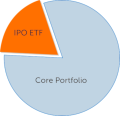Despite geopolitical turmoil and a major flop from Birkenstock (BIRK) rocking the IPO market last week, a handful of large issuers are lining up to go public. Two sizable IPOs launched on Monday, joined by two notable initial filings.
For access to more exclusive content like this, sign up for a free trial of IPO Pro, the platform that gives you all of the IPO information you need, all in one place.
Late stage biotech Abivax (ABVX) set terms for a $250 million IPO that would value the company at $859 million. Cross-listing from France, the drug developer plans to price its US this week. Oil and gas producer Mach Natural Resources LP (MNR) is on tap to price early next week, slated to raise $200 million at a $1.9 billion market cap. In the pipeline, Bermuda-based reinsurer Hamilton Insurance Group (HG) and hospital billing platform Waystar (WAY) both filed for $100+ million IPOs.
The recent developments call back to earlier this year, which saw the energy, financials, and biotech sectors drive the flow of large deals.
Mach is the 2023 IPO market's second energy MLP, while Hamilton would be the third insurance play. Abivax is continuing both the trend of big biotechs, as well as sizable cross-listings. Waystar is more unique, but the profitable and growing PE-backed company still shares similarities with other large IPOs.
While returns from the year's $100+ million IPOs have deteriorated in the past few months, just over half of the group trades above issue. Biotech IPOs have delivered mixed returns, driven by Structure Therapeutics' (GPCR) 333% gain. The energy and financials sectors have produced some of the strongest performers.
Oil and gas producer TXO Energy Partners LP (TXO) has traded off since its first day but has hovered around its IPO price; the other energy deals (AESI and KGS) have recovered from initial losses. Reinsurer and Hamilton's close peer Fidelis Insurance (FIHL) is solidly above issue, and specialty insurer Skyward (SKWD) is currently the second-best performing $100+ million IPO.
Sector trends are encouraging, but performances from recent large issuers have shown that valuation continues to be a sticking point. The latest batch of IPOs will need to appease public investors, which likely means going public at a clear discount to public peers.


